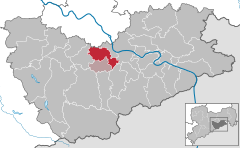Dohna
| Dohna | ||
|---|---|---|

Dohna
|
||
|
||
| Coordinates: 50°57′17″N 13°51′27″E / 50.95472°N 13.85750°ECoordinates: 50°57′17″N 13°51′27″E / 50.95472°N 13.85750°E | ||
| Country | Germany | |
| State | Saxony | |
| District | Sächsische Schweiz-Osterzgebirge | |
| Municipal assoc. | Dohna-Müglitztal | |
| Area | ||
| • Total | 28.57 km2 (11.03 sq mi) | |
| Elevation | 130-150 m (−360 ft) | |
| Population (2015-12-31) | ||
| • Total | 6,299 | |
| • Density | 220/km2 (570/sq mi) | |
| Time zone | CET/CEST (UTC+1/+2) | |
| Postal codes | 01809 | |
| Dialling codes | 03529 | |
| Vehicle registration | PIR | |
| Website | www.stadt-dohna.de | |
Dohna is a town in the Sächsische Schweiz-Osterzgebirge district, Saxony, Germany. It is located south of Heidenau, in the Müglitz valley and lies at the northeastern foot of the Eastern Ore Mountains. It is accessed by the Pirna interchange of highway A17, and by the Dohna (Sachs) and Köttewitz stations of the Müglitz Valley Railway.
Dohna is one of the oldest towns in Saxony. Traces of settlement dating back to the 16th century BC (Bronze Age) have been found. The Dohna Castle on a strategic hill at the entrance to the Müglitz valley was probably already built in the middle of the 10th century. The town Dohna was first documented as Donin in 1040. The name comes from Property of Doň from the Bohemian first name Zdoň.
The town and its castle controlled two roads from Saxony to Bohemia: one through the Müglitz valley, and one over the heights to Kulm. The burgraves of Dohna controlled a large territory between the Margraviate of Meissen and the Kingdom of Bohemia, stretching from Rabenau in the west to Gottleuba in the east. The burgraves of Dohna were defeated in 1402 in the Dohna Feud, and the town was given to vassals of the Wettin Margrave of Meissen. After 1460, when the seat of administration moved to Sonnenstein Castle in Pirna, the castle fell into ruins. The city was devastated by French and Russian troops during the Napoleonic Wars (1813).
...
Wikipedia




